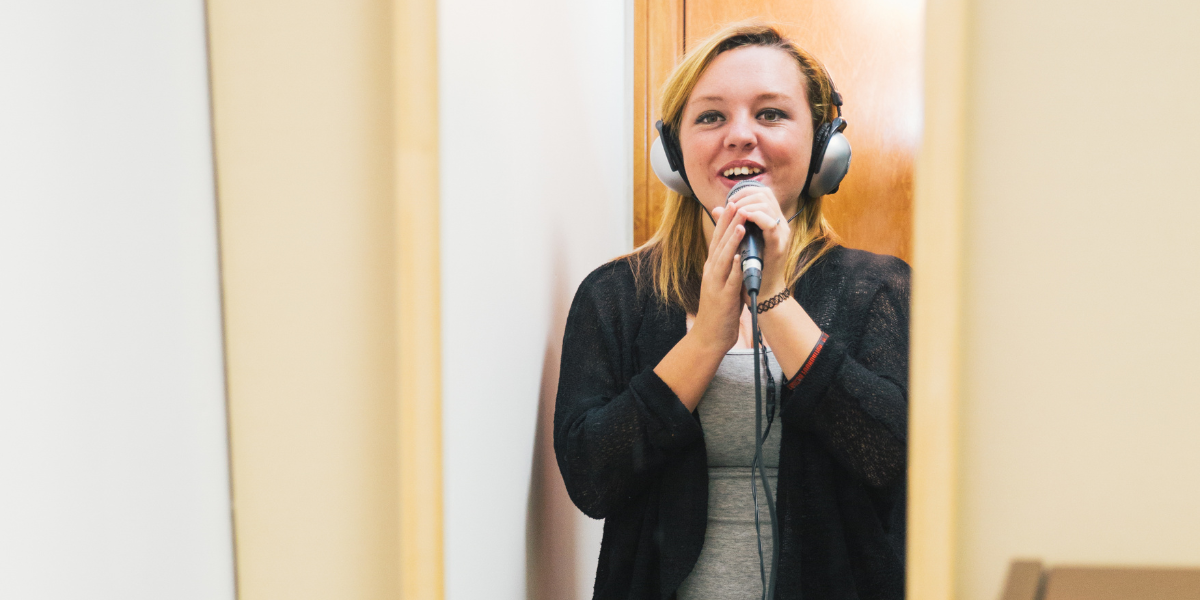Vocal Lessons in Toronto: Stage Fright through Guided Training
Stage fright or performance anxiety can grip anyone, from beginners to seasoned singers. It’s a common hurdle that music enthusiasts face, often hindering their true potential. In Toronto, known for its vibrant and diverse music scene, overcoming this fear through guided vocal lessons is a journey many embark upon. These vocal lessons in Toronto aren’t solely about hitting the right notes; they’re about hitting the high notes of confidence and self-expression. This journey, especially in a city buzzing with artistic opportunities like Toronto, is as transformative as it is enlightening.

The Dual Path of Vocal Lessons in Toronto: Technique and Confidence
Vocal training has always been perceived through the lens of improving one’s singing abilities—perfecting pitch, understanding rhythm, and mastering various techniques. However, Elite Music Academy’s vocal lessons in Toronto take a more holistic approach. They’re about building a performer from the inside out, focusing equally on the technical aspects of voice training and the personal development of the singer. Confidence and technique become two sides of the same coin, each incomplete without the other. Instructors pay close attention to this, ensuring that while students learn to control their vocals, they’re also building a persona that feels at home on stage. This duality is what sets vocal lessons in Toronto apart, preparing students for the real world of music, where their presence is just as impactful as their voice.
Bridging Skills and Self-Confidence
Engaging in vocal lessons in Toronto represents a dual journey. On the one hand, students immerse themselves in the technical aspects of voice modulation, pitch control, resonance, and tonal quality, vital for any singing endeavor. However, these lessons play an equally critical role in bridging the gap between skill and self-assurance. In the heart of Toronto’s music scene, students face unique pressures and expectations, making confidence indispensable. Confidence doesn’t just influence the notes that singers hit; it defines the presence they command while on stage. It’s the secret ingredient that turns performances from mundane to magnetic. This understanding is embedded in Toronto’s vocal training curriculum, ensuring students emerge as complete performers.
The Unique Benefits of Vocal Lessons in Toronto
Toronto, a bustling hub with a rich artistic heritage, offers a competitive yet nurturing environment for vocal students. Here, vocal training is not merely an academic exercise but a deep, personal journey of musical discovery. The city’s diverse musical ecosystem exposes students to various genres, performance styles, and audience expectations, contributing to a well-rounded education. Instructors in Toronto, therefore, adopt a holistic teaching approach, infusing lessons with real-world experiences and cultural nuances unique to the city. This exposure ensures that students don’t just develop their singing abilities but also acquire stagecraft and performance etiquette, crucial for live performances and audience engagement.
Specific Techniques for Building Confidence
While vocal control and range are essential, they’re only part of the equation for successful performers. Vocal lessons in Toronto incorporate a variety of specific techniques aimed at building a student’s confidence. These methods help students understand and control their anxiety, using it to add passion and authenticity to their performance rather than allowing it to be a hindrance. They involve a comprehensive approach, from physiological techniques like controlled breathing and posture improvements to psychological strategies like positive affirmation and exposure therapy. Each technique is designed to make students more comfortable with the idea of performing, turning the stage into a friend rather than a foe. As students progress, they find that these techniques become second nature, seamlessly integrating into their performances.
Mastering Breathing and Posture
During vocal lessons, students learn that control over their breathing is the first step in conquering stage fright. Proper breath control techniques help stabilize the voice, giving students a sense of predictability and control, even when nervous. Similarly, maintaining the right posture isn’t only about voice projection; it’s about presenting oneself with confidence. Students learn to stand tall, with relaxed shoulders and an open chest, exuding a presence that can captivate audiences. These nuances of performance are emphasized in training sessions, providing students with tangible anchors to maintain control during live performances.
Visualization and Mental Rehearsals
Visualization is more than a mere practice; it’s an immersive technique used within Toronto’s vocal coaching circles to prepare students for performances. By picturing themselves on stage, executing a flawless performance, students create a positive mental framework that eases performance anxiety. Instructors guide students through these visualizations, teaching them to anticipate the feel of the stage, the audience’s reactions, and even the potential mishaps that might occur. This comprehensive mental preparation is a form of rehearsal that, when combined with physical practice, crafts a confident, prepared, and adaptable performer.
Embracing Vulnerability through Performance
Performance is an act of vulnerability, where singers expose their emotions to the audience. Vocal lessons in Toronto emphasize the power of this vulnerability, encouraging students to view it as an avenue for authentic expression rather than a source of fear. Through guided sessions, budding vocalists learn to channel their feelings into their performances, transforming raw emotions into a compelling stage presence. This process not only helps in managing stage fright but also in forming a deeper connection with the audience. When performers realize that their vulnerability can be a strength and not just a liability, they begin to embrace the stage with confidence and openness.
The Power of Regular Recitals and Live Performances
The concept of ‘practice makes perfect’ is a fundamental truth in music, and even more so when addressing performance anxiety. Vocal lessons in Toronto often include regular recitals, providing students with an invaluable opportunity to test their skills and confront their fears in a supportive environment. These live performances, often starting small and gradually increasing in audience size, help desensitize students to the stress associated with performing. They learn to deal with unexpected situations, interact with audiences, and more importantly, they learn to trust themselves. Each performance serves as a building block, slowly constructing a confident persona that thrives under the spotlight. This practical experience, under careful guidance, is often what helps students turn a corner, transforming fear into excitement.
The Journey from Classroom to Stage
Vocal lessons in Toronto often incorporate live performances, a practical step in the transition from the classroom to the stage. These recitals, ranging from small classroom concerts to larger public events, provide a safe space for students to test their skills, experience the dynamics of live audiences, and learn to manage the unpredictability of live performances. With each recital, students confront their fears head-on, gradually diminishing the anxiety that once overshadowed their capabilities. This methodical, real-world exposure is a crucial phase in the training, designed to build not just skill, but also the emotional resilience necessary for live performances.
Finding the Right Mentor: The Role of an Empathetic Instructor
In the journey of overcoming stage fright, perhaps the most critical factor is the role of the instructor. Vocal coaches in Toronto understand that an empathetic, supportive approach can make a world of difference. These mentors are not just teachers; they’re confidants and cheerleaders, providing a safe space for students to express their fears without judgment. They adapt their teaching styles to fit the emotional needs of each student, recognizing when to push and when to be patient. The trust established in this relationship allows students to take risks, make mistakes, and explore their capabilities without fear of criticism. It’s through this bond that students truly start to come out of their shells, often achieving more than they believed possible.
The Student-Instructor Bond
A pivotal element in this journey is the relationship between the student and the instructor. Vocal instructors in Toronto are known for their empathetic approach, recognizing that every student brings unique fears and insecurities to the table. They invest time in understanding these individual challenges, adapting their teaching methods to provide personalized guidance. This nurturing environment, where fears are acknowledged and addressed directly, helps students build trust, encouraging them to step out of their comfort zones. The bond forged between the student and instructor becomes the bedrock upon which confidence is built.
Why Choose Elite Music Academy?
Choosing to train with us means opting for a comprehensive vocal training experience. In the competitive yet nurturing environment of Toronto, our academy isn’t just another music school. We promise a journey of musical self-discovery, where training is deeply personal and reflective of the city’s diverse musical landscape. Our instructors are committed to a holistic teaching philosophy ensuring that students not only gain valuable knowledge but also build confidence by integrating real-life performance wisdom into their sessions.
Moreover, with Elite Music Academy’s vocal lessons in Toronto, students learn more than just singing. They imbibe the essence of stagecraft and performance etiquette, integral to live performances and real-world audience engagement.
FAQs
1. What is unique about vocal lessons in Toronto, specifically at Elite Music Academy?
Elite Music Academy in Toronto offers a holistic approach to vocal training, focusing not only on singing techniques but also on building a performer’s confidence and stage presence. This dual-path method prepares students for real-world performances, ensuring they are technically proficient and emotionally prepared.
2. Are these vocal lessons suitable for beginners experiencing performance anxiety?
Absolutely. The vocal lessons are designed to help performers at all levels, from beginners to seasoned singers. Beginners will benefit significantly as the training starts with foundational techniques, gradually building up their confidence alongside their singing abilities.
3. Do students get the opportunity to perform live during their training?
Yes, a core component of the training program is participation in live performances. Students will engage in recitals and concerts, starting from smaller audiences to larger events, providing practical experience and helping them acclimate to being on stage in a controlled and supportive manner.
4. Is the focus only on solo performances, or do students also learn about group dynamics on stage?
While individual confidence is a significant component, understanding and thriving in group dynamics are also covered in the lessons. Students learn about ensemble performances, harmonizing, and engaging with band members or co-performers, preparing them for a variety of performance settings.
5. How does Elite Music Academy incorporate Toronto’s diverse music scene into its curriculum?
Elite Music Academy takes full advantage of Toronto’s rich artistic environment, exposing students to various genres and performance styles. Vocal lessons in Toronto are infused with real-world experiences and cultural nuances unique to Toronto, ensuring students receive a well-rounded musical education.


